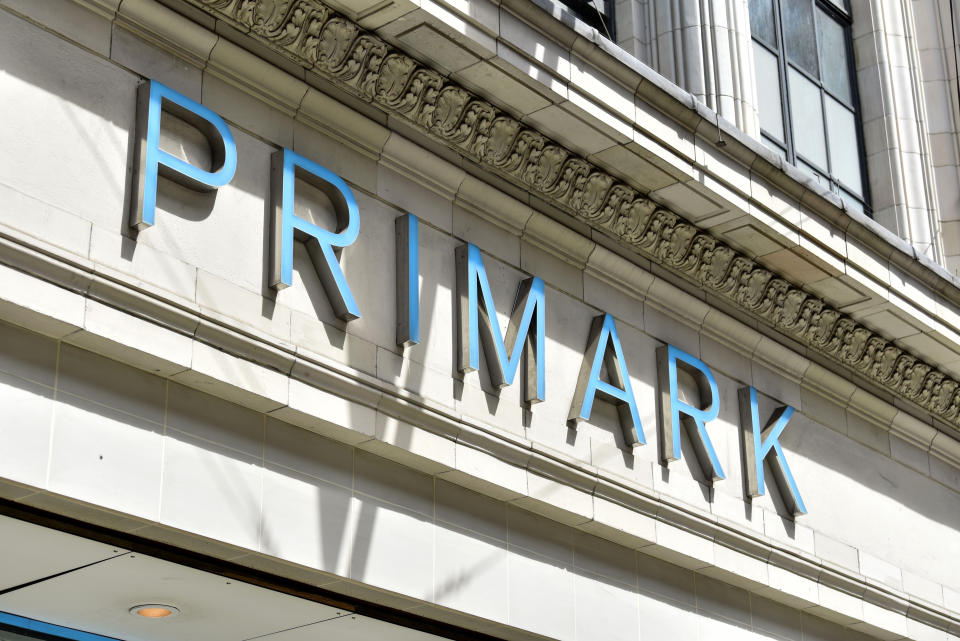What to watch: Primark optimism, Pizza Express restructure, pound sinks on Brexit

Here are the top business, market, and economic stories you should be watching today in the UK, Europe, and abroad:
'Encouraging' signs at Primark as stores reopen
Sales at Primark have beaten expectations since stores began re-opening in May, but performance is uneven across the country due to changes in ways of living and working.
Associated British Foods (ABF.L), which owns Primark, said in a trading update on Monday that sales across its business had “exceeded our expectations” in recent weeks.
“In the latest four-week UK market data for sales in all channels, Primark achieved our highest ever value and volume shares for this time of year,” the company said.
While Primark’s UK sales are down around 12% over the last 12 months due to extended store closures, ABF said “sales performance since reopening has in aggregate been reassuring and encouraging.”
Shops benefited from pent-up demand when they began re-opening and sales since re-opening have hit £2bn ($2.61bn), ABF said.
Creditors approve Pizza Express restructuring plans
Popular chain Pizza Express said on Monday that creditors had approved restructuring plans that will close 73 of its restaurants and put as many as 1,100 jobs at risk in the UK.
In a statement, the company said that 89% of its creditors voted in favour of its proposed company voluntary arrangement (CVA) restructuring deal, securing more than 9,000 jobs.
“The successful vote unlocks the company’s ability to actively address the challenges brought by COVID-19,” Pizza Express said.
“Regrettably, the CVA proposes the closure of 73 restaurants, putting 1,100 jobs at risk,” it said.
Pizza Express announced the sweeping restructuring process, which will see widespread rent reductions, late last month.
Noting that most of its 454 restaurants have been profitable over the past three years, the company said that declining earnings had been exacerbated by the impact of the coronavirus pandemic.
In early August, Pizza Express said it had hired advisers from Lazard to lead a sale process for the business.
Pound slips on no-deal Brexit fears
The pound fell against the dollar and the euro on Monday morning, amid growing fears that the UK is preparing for a no-deal Brexit at the end of the year.
Speculation mounted over the weekend that Britain was preparing for the collapse of trade talks with the European Union, putting the UK on course to end the Brexit transition period without a deal at the end of December.
It came amid reports that the UK would renege on key parts of the Withdrawal Agreement signed with the EU.
“Brexit came roaring back into the picture over the weekend — specifically fears of a no-deal,” Connor Campbell, a financial analyst at SpreadEx, said on Monday morning.
The pound was down 0.7% against the dollar by 10.30am, falling to $1.317 (GBPUSD=X). Sterling has fallen over 1% against the dollar over the last 5 days.
UK house prices at record high after biggest leap since 2016
UK property prices have hit a record high after their biggest monthly leap since 2016.
The average property sold for £245,747 ($325,000) in August, according to a widely-followed house price index released on Monday by lender Halifax.
It marks a 1.6% increase on prices in July and 5.2% rise on a year earlier, the biggest monthly jump since late 2016. The price gains still came in below analysts' expectations however, with most expecting a 6% rise year-on-year.
Britain’s property market has seen sales and prices boom in recent months, with a surge in demand post-lockdown and a temporary stamp duty holiday driving growth.
Separate figures by rival lender Nationwide last week showed prices at a new all-time high in August.
German industrial rebound slows
Germany’s manufacturing companies recorded a rise in production for the third month in a row in July.
However, the 1.2% month-on-month growth in industrial output fell significantly below economists’ expectations of around 4.7% growth.
July data from the Federal Bureau of Statistics revealed a loss of momentum compared to immediate post-lockdown months of May and June, when production rose by 7.4% and 9,3% respectively.
“The improved mood among companies and the reduction in short-time work suggest that the recovery process will continue in the coming months, although it may take some time,” the federal economics ministry said, noting that German industry is back at nearly 90% of pre-crisis levels.
Production in the key automotive sector got a nearly 7% month-on-month boost in July, but is still 15% under pre-pandemic levels.
The Ifo economic institute’s index on industry expectations showed a rise in August, to 15.4 points from 14.3 in July.
European stocks rebound following Wall Street tech sell-off
European stocks rebounded on Monday following last week’s sell-off of technology stocks on Wall Street.
The pan-European STOXX 600 index (^STOXX) rose by around 1%, while London’s FTSE 100 (^FTSE) climbed by more than 1.4%.
Germany’s DAX (^GDAXI) rose by around 1.3%, while France’s CAC 40 (^FCHI) was up by around 1.2%.
Tech stocks led a stock market rout in the US last week, as investors began to turn away from the clear equity leaders from the past several months.
The Financial Times on Friday reported that Japan’s Softbank was the “Nasdaq whale” that “stoked the fevered rally in big tech stocks.”
The Wall Street Journal reported that SoftBank spent around $4bn (£3bn) buying call options on stocks, leaving the market vulnerable to a disorderly equities sell-off.
What to expect in the US
While markets in the US are closed due to Labor Day, futures are pointing to further losses on Tuesday.
Futures on the S&P 500 (ES=F) fell by around 0.2%, while Dow Jones Industrial Average futures (YM=F) were flat.
Futures on the Nasdaq (NQ=F), which last week had its worst weekly performance since March, fell by around 1%.

 Yahoo Finance
Yahoo Finance 
